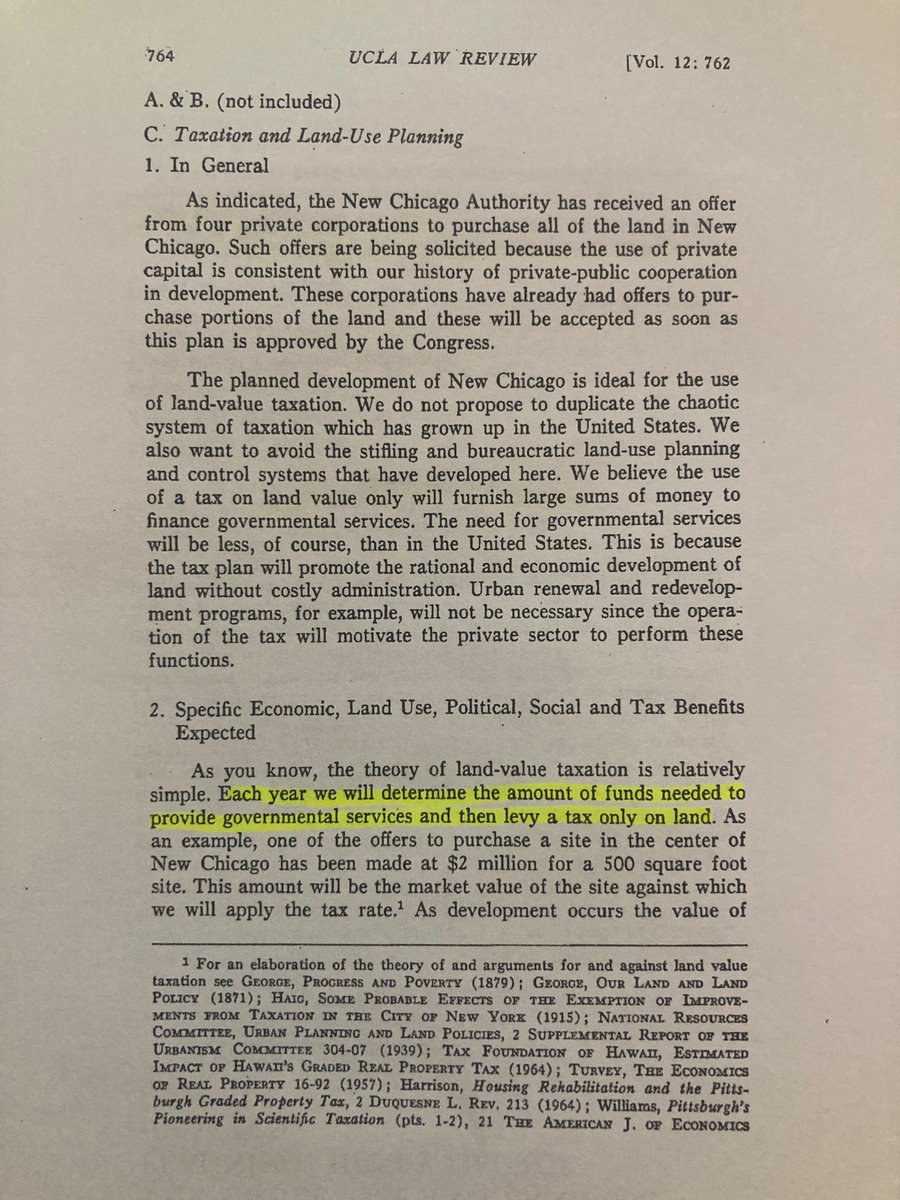
In part 2 of my Georgism series, Wyatt, the sole critical paper I could find, cited an elusive paper by Hagman. An intrepid reader sent me a copy, and we’re already of to a great start as it opens with a fictional letter to the author concerning a report on Land Value Tax on Mars 

The Secretary of Space is now writing to Henry George III and giving him orders from the President of the United States to set up the colony of New Chicago on the planet of Mars at a location scouted by Colonel John Glen II
Basic Martian land tax policy is to first establish a budget, and then raise that amount of money from land rents and no more. This is basically identical to the policy Ted Gwartney supports, and probably falls well short of 100% LVT in this scenario 

George III expects land value increase from development to fully cover public spending needs, citing evidence from Howe from 1904-1908 

George III insists LVT will not be passed on to the tenant, citing something from Haig.
Starting to feel Wyatt is doing his selective citing of Georgists thing again where he misrepresents what they actually say
Starting to feel Wyatt is doing his selective citing of Georgists thing again where he misrepresents what they actually say
Omg it gets better. This whole thing is a bizarre Georgist fan fic frame story! HAGMAN IS NOT GOING TO BREAK CHARACTER FOR THIS WHOLE THING.
Okay entire history of land taxation of Earth. Let’s go future space George.
So weird!
Okay entire history of land taxation of Earth. Let’s go future space George.
So weird!

This was published in the UCLA law review by the way, so remember that next time your favorite sci fi short story gets rejected.
We're told the movement reached it's height between 1910-1920 during which there were two prominent experiments: The Houston Plan under J. J Pastoriza, and The Pittsburgh-Scranton experiment.
I wrote about Pastoriza and Houston here earlier:
I wrote about Pastoriza and Houston here earlier:
https://twitter.com/larsiusprime/status/1427107150053183505
I will definitely be looking up the citation for the Pittsburgh-Scranton experiment later.
There were no other major experiments in the USA according to Space George, other than Hawaii in the 60's, which he argues doesn't really qualify as a truly Georgist LVT experiment.
There were no other major experiments in the USA according to Space George, other than Hawaii in the 60's, which he argues doesn't really qualify as a truly Georgist LVT experiment.
"Early experiments begun in other countries however, notably in France, Denmark, Germany, Australia, New Zealand, and Canada, were continued and in some instances expanded in scope."
Allegedly Pittsburgh had shown success as late as the 60s and a Georgist revival was growing when the Joint Center for Urban Studies started lobbying against it 

Space George name checks all the Georgist organizations of the 20th century, describes them as poised to strike when state constitutional bars on split rate taxation (pastoriza’s bane) struck 

This thing just goes on and on, I found the part Wyatt is quoting. The "Valuer General of New Zealand" mentioned in Wyatt is a fictional character visiting New Chicago, Mars, to explain the history of Land Value taxation in New Zealand.
Okay! So what follows after that is an account of Land Value Taxation succeeding really well early on, and then dramatically falling apart for various reasons and concludes with Land Value Taxation being a dramatic failure on Mars.
The problems that happened on new Mars are (keep in mind this is all a piece of weird fan fiction):
- Difficulty with assessments
- LVT supporting such dense building that there was TOO MUCH density
- Overtaxation
- Difficulty with assessments
- LVT supporting such dense building that there was TOO MUCH density
- Overtaxation
Okay so now we have the historical interview with the Valuer General of New Zealand. It's a weird fan fiction frame story in space, but it's still a historical account.
WHAT WENT WRONG IN NEW ZEALAND, OH WISE VALUER GENERAL?
WHAT WENT WRONG IN NEW ZEALAND, OH WISE VALUER GENERAL?
Okay! An actual claim here, and it looks like Wyatt wasn’t jerking our chain after all. Hagman actually supports his claim 

Aaaand that's it for New Zealand. So if we want to know more we have to look up the citation for Bird and the 1961 Assessors' News Letter.
Hagman never talks about this again and just goes on to talk about the failed fictional LVT experiment on Mars
Hagman never talks about this again and just goes on to talk about the failed fictional LVT experiment on Mars
So the weird frame story is obviously a vehicle for transposing historical details about things that happened on Earth with LVT experiments and working them out as a thought experiment, but the framing is SUPER unhelpful as it's hard to separate historical account from fiction
Basically this article is a super weird way to make what amounts to a mostly theoretical argument with a sprinkling of historical details. In the end this article is mostly only useful to mine for its citations.
We get a little taste of some kind of vague problem with New Zealand's LVT experiment but we're just told there was "no evidence" but it's not really explained what went wrong
Crucially, we don't see ANYTHING from the Valuer General of New Zealand telling us about whether land value taxes are capitalized into the price of land, which is the only thing we really cared to find out about by going down this rabbit hole.
oops broke the thread, continue here:
https://twitter.com/larsiusprime/status/1469544752240640001
• • •
Missing some Tweet in this thread? You can try to
force a refresh





